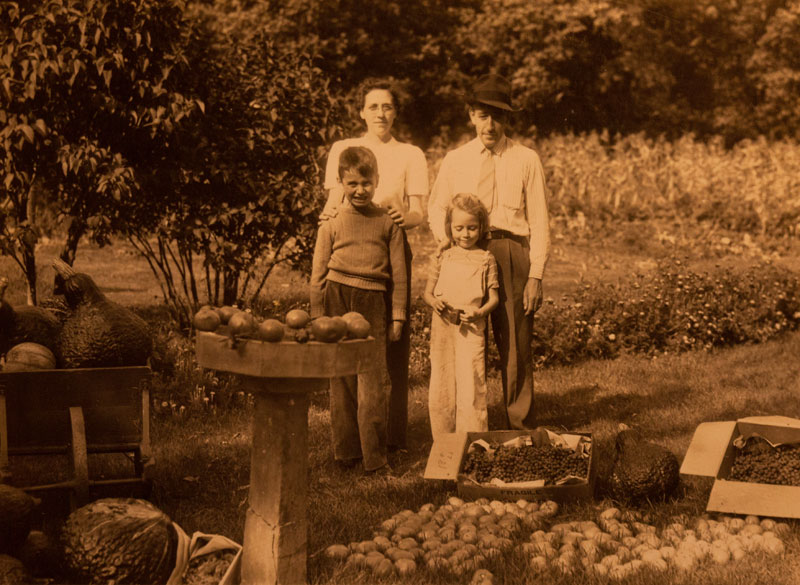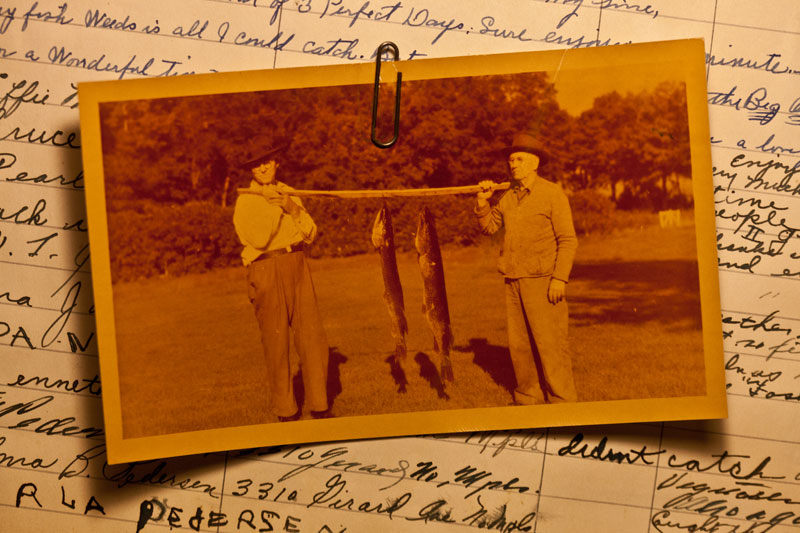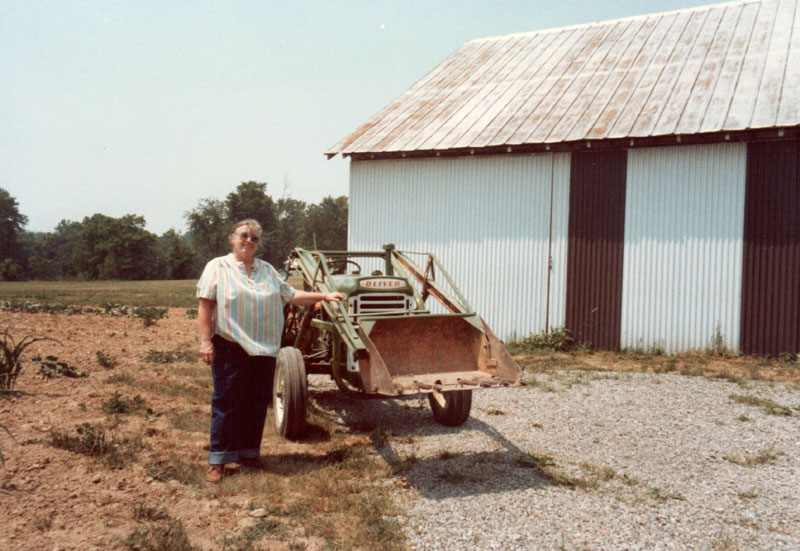Farmer Jacobs and Wife
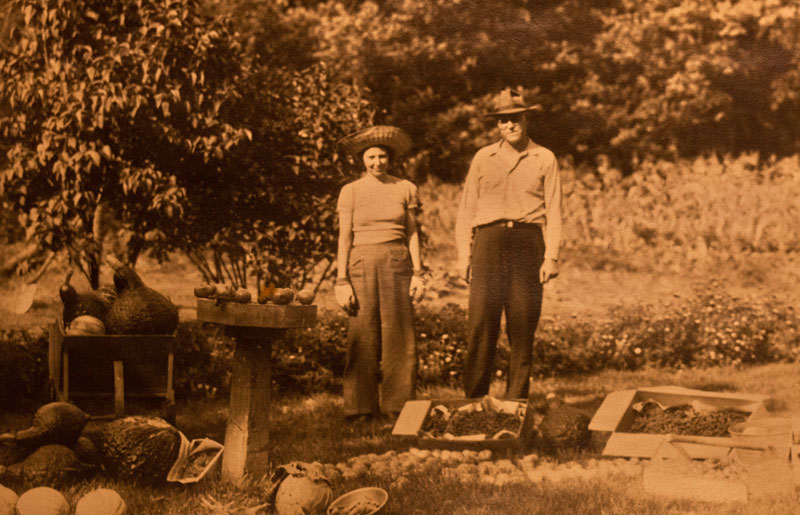 Parents – You love them deeply and pray at the same time that you never become anything like them. I should assure Kate (Dina’s mom and Plough & Stars soap fairy) that this sentiment doesn’t come to mind because she’s currently visiting us. Rather, it’s spurred by the following quote from Clarence Beck, the son of a Dust Bowl farmer, who was interviewed in Ken Burns’ most recent documentary:"God, what do I have to do to have money and not be a farmer? I don't care whether it is being a pimp, I don't care whether it is stealing - whatever it takes so that I’m not going to farm and I'm not going to be broke." Ultimately, Clarence’s prayers were answered. He didn’t become a farmer - or a pimp for that matter. But genetics are hard to escape. It turns out that in our march back to the land, Dina and I are walking a well-trodden path traveled most recently by our own grandparents.
Parents – You love them deeply and pray at the same time that you never become anything like them. I should assure Kate (Dina’s mom and Plough & Stars soap fairy) that this sentiment doesn’t come to mind because she’s currently visiting us. Rather, it’s spurred by the following quote from Clarence Beck, the son of a Dust Bowl farmer, who was interviewed in Ken Burns’ most recent documentary:"God, what do I have to do to have money and not be a farmer? I don't care whether it is being a pimp, I don't care whether it is stealing - whatever it takes so that I’m not going to farm and I'm not going to be broke." Ultimately, Clarence’s prayers were answered. He didn’t become a farmer - or a pimp for that matter. But genetics are hard to escape. It turns out that in our march back to the land, Dina and I are walking a well-trodden path traveled most recently by our own grandparents.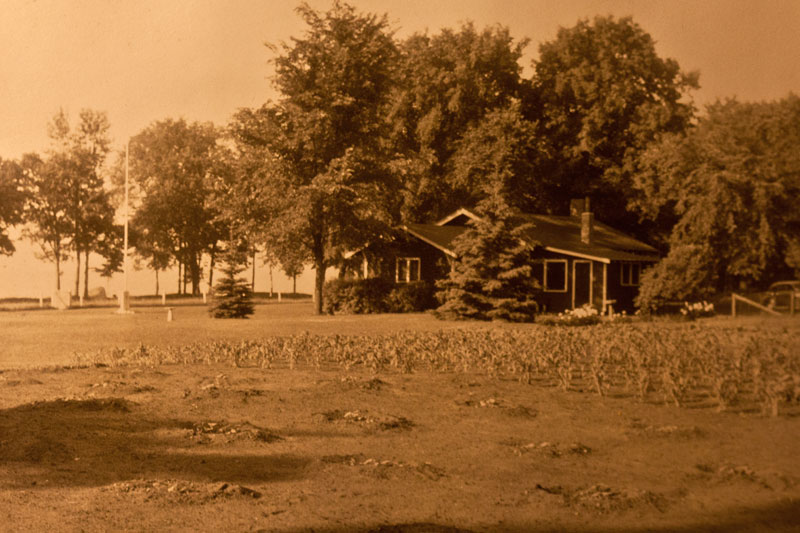 My dad recently unearthed a dusty and forgotten guest book that tells of a decade of summers spent on Minesota’s Lake Mille Lacs (French for ‘thousand lakes’ but pronounced colloquially as ‘mul-ax’). Toward the end of WWII, my grandparents, Mabel and Joseph Jacobs, bought forty acres and a clapboard cabin that they crammed with visitors from frost to frost. Their war-weary friends would beat a path to their door seeking some uncomplicated peace and a game of croquet. At the end of their stay, they scribbled their names, addresses and commentaries in the small brick-orange book, which reads like a seven-year inventory of potatoes planted, peas canned and fish caught.The first page opens like this:“Grand day – wonderful meal. New radish – young onions, odorless?? – Fresh Ham!!! – Blueberry Pie – All produced by our host, “Farmer Jacobs and Wife” – W. Hayward June 18th, 1944.
My dad recently unearthed a dusty and forgotten guest book that tells of a decade of summers spent on Minesota’s Lake Mille Lacs (French for ‘thousand lakes’ but pronounced colloquially as ‘mul-ax’). Toward the end of WWII, my grandparents, Mabel and Joseph Jacobs, bought forty acres and a clapboard cabin that they crammed with visitors from frost to frost. Their war-weary friends would beat a path to their door seeking some uncomplicated peace and a game of croquet. At the end of their stay, they scribbled their names, addresses and commentaries in the small brick-orange book, which reads like a seven-year inventory of potatoes planted, peas canned and fish caught.The first page opens like this:“Grand day – wonderful meal. New radish – young onions, odorless?? – Fresh Ham!!! – Blueberry Pie – All produced by our host, “Farmer Jacobs and Wife” – W. Hayward June 18th, 1944.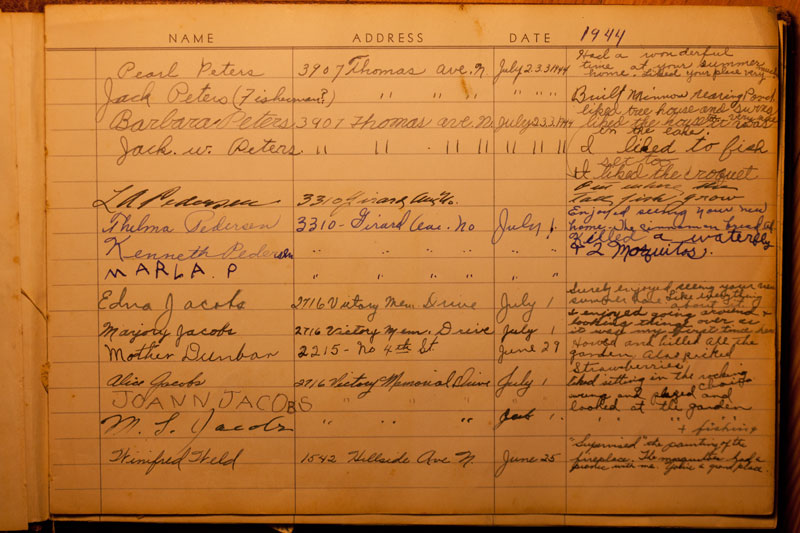 Sixty-three years later, an urbanite going to Farm School is enough to warrant a four-page spread in the newspaper – as if we’re inventing something. But these old pictures make one thing clear - we’re not pioneers of any sort. Sure, it’s a departure from today’s norm, but look only as far back as Eli Whittney and the cotton gin, and nearly 90 percent of our forebears worked with dirt and plough.So as I head back to the farm after Christmas break, I wanted to give life to faces and voices that are both distant and increasingly familiar – the black and white remnants of all of our recessive genes. And if my ancestor’s gardening successes are my legacy, perhaps I should start a CSA’s for freakishly huge squash.
Sixty-three years later, an urbanite going to Farm School is enough to warrant a four-page spread in the newspaper – as if we’re inventing something. But these old pictures make one thing clear - we’re not pioneers of any sort. Sure, it’s a departure from today’s norm, but look only as far back as Eli Whittney and the cotton gin, and nearly 90 percent of our forebears worked with dirt and plough.So as I head back to the farm after Christmas break, I wanted to give life to faces and voices that are both distant and increasingly familiar – the black and white remnants of all of our recessive genes. And if my ancestor’s gardening successes are my legacy, perhaps I should start a CSA’s for freakishly huge squash.
* * * * *

